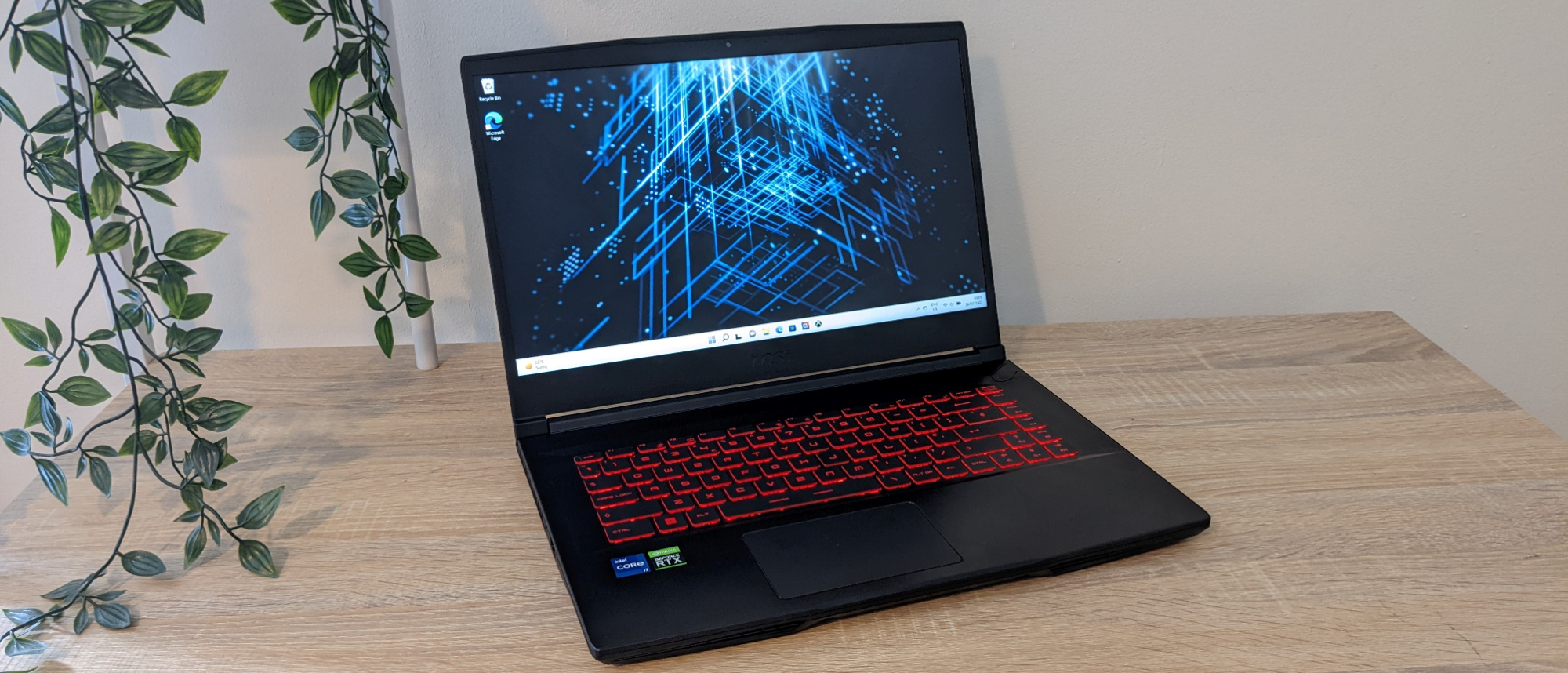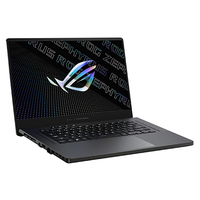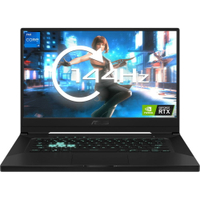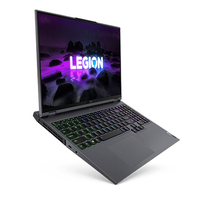TechRadar Verdict
A sensibly priced gaming laptop that doesn’t feel cheap? Decent 1080p performance without horribly noisy fans? A sturdy chassis with a comfortable, responsive keyboard? Yes, the MSI GF63 Thin has all this and more, making it a fantastic value option despite its unimpressive battery life.
Pros
- +
Excellent performance given the price
- +
Solid build quality
- +
Good range of ports
Cons
- -
Average battery life
- -
Some annoying bloatware
- -
Charge cable can block a USB port
Why you can trust TechRadar
MSI GF63 Thin: Two-minute review
The latest model of the MSI GF63 Thin is here, and I won’t mince words: it’s, without a doubt, one of the best budget gaming laptops you can buy right now. At £799 (with cheaper models available), it offers decent 1080p gaming performance that won’t make your bank account cry, and somehow also manages to present itself in a sturdy chassis that feels good to use.
Packing an Intel Core i7 processor (though it’s a previous-gen 11800H, not one of the fancy new 12th-gen Alder Lake chips) and an Nvidia RTX 3050 Ti graphics card, the GF63 Thin isn’t going to hit 60fps at Ultra settings in every game, but dialing back the texture details a bit will see you reach comfortable frame rates easily in most titles on its 15.6-inch 1080p display. It’s quieter than many gaming laptops when the fans are at full spin, too.
The GF63 series has been floating around for a little while, with previous models employing GPUs such as the GTX 1660 and 1650, but this step forward into RTX territory is a game changer. Nvidia’s budget GPUs are more powerful than ever, making them an excellent choice for a gaming laptop that won’t cost the world.
The chassis is devoid of most ‘gamer’ aesthetics, with just red trims and LED backlighting on the keyboard, but the rest of the laptop is entirely black, meaning that it can comfortably double as a laptop for work or school without looking wildly out of place. The performance and display mean it’s not well-suited for highly demanding tasks, like 4K video editing and running number-crunching scientific programs, but for the average student or office worker it should fulfill all your needs.
Add in a solid range of physical ports and Wi-Fi 6 support, and you’ve got an impressively well-rounded laptop for the asking price. My criticisms of the MSI GF63 Thin feel almost flimsy when it’s such good value for money; yes, the battery life could be better, and yes, it comes pre-loaded with some bloatware courtesy of MSI and Microsoft, but these are complaints I could level at more than half of the gaming laptops I’ve reviewed.
In short, this is not just a great wallet-friendly pick, but one of the best gaming laptops you can buy right now, especially if you’re on a budget. The slimmed-down chassis and 1.86kg weight mean that it’s less chunky than many 15.6-inch laptops too, so this is one portable gaming system you can truly take out and about.
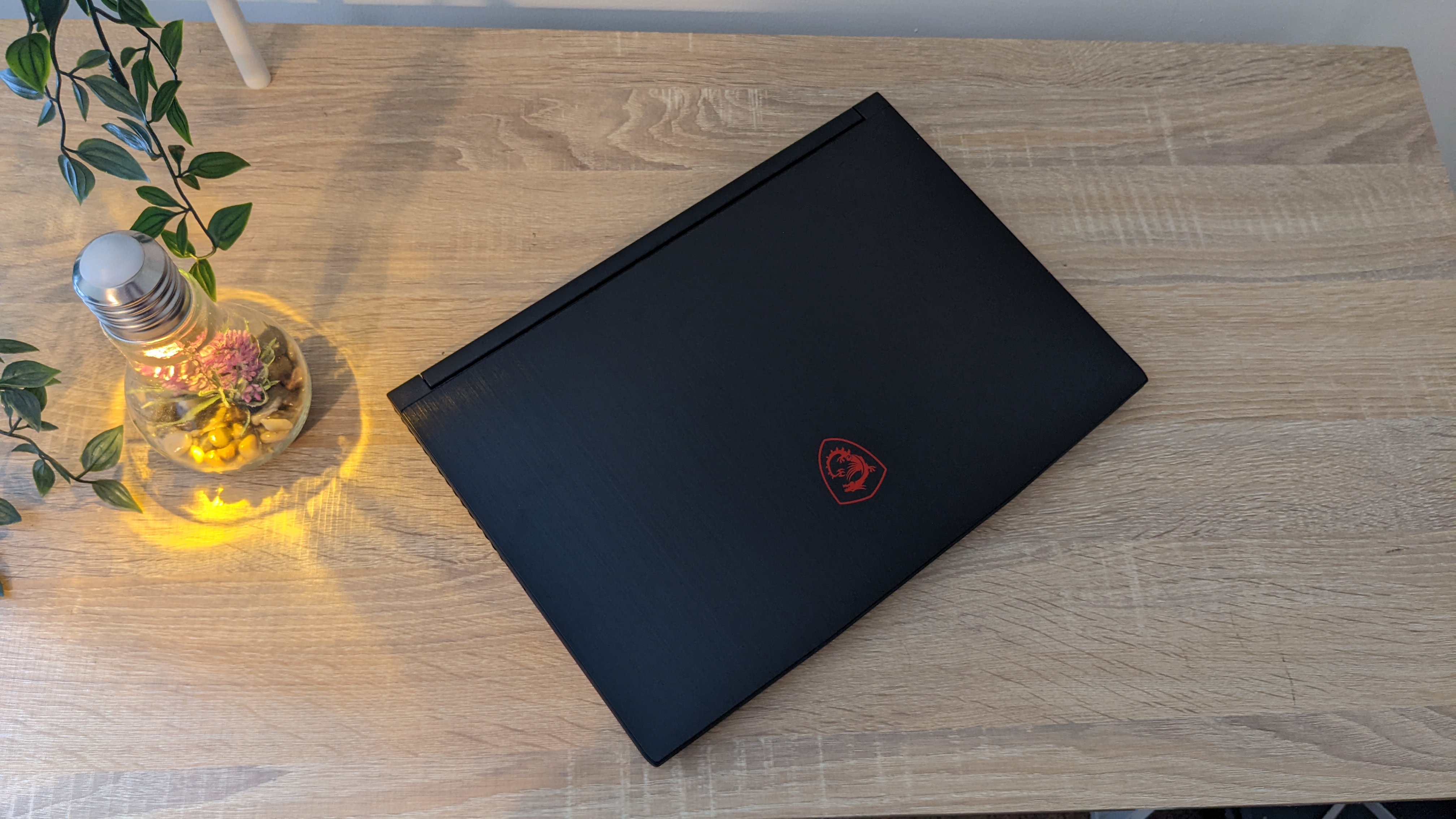
MSI GF63 Thin: Price and availability
- Starting price of £599
- Version tested costs £799
- Available models vary by region
Here is the MSI GF63 Thin configuration sent to TechRadar for review:
CPU: Intel Core i7-11800H
Graphics: Nvidia GeForce RTX 3050 Ti
RAM: 8GB DDR4-3200
Screen: 15.6-inch 1920x1080 IPS-level, 144Hz
Storage: 512GB PCIe Gen3 SSD
Ports: 3x USB-A 3.2 Gen 2, 1x USB-C 3.2 Gen 2, 1x HDMI 2.1, RJ-45 Ethernet, 3.5mm mic in, 3.5mm headphone out
Connectivity: Wi-Fi 6, Bluetooth 5.2
Camera: 720p webcam
Weight: 1.86 kg
Size: 2.2 x 35.9 x 25.4 cm
There are a few different versions of the MSI GF63 Thin on the market right now, with many laptop retailers in the West still selling older models running 9th- or 10th-gen Intel processors. MSI doesn’t sell its laptops directly in the US and UK, so pricing is often set by competing retailers and it can be tricky at times to find specific models.
The current-gen RTX 3050 Ti model we’ve reviewed here costs £799 (about AU$1,385) in the UK, and although this exact configuration isn’t available in the US, we found a comparable model for $900. The cheapest model with a GTX 1650 costs £599 ($629, about AU$1,035), while an RTX 3050 version sits between these in price.
It’s still a lot of cash to drop on a laptop (and US pricing is frankly all over the place right now) but this does represent pretty excellent value for money if you want a full-featured gaming laptop but can’t afford to drop more than a thousand bucks on it. We would recommend springing for one of the RTX models rather than the slightly outdated GTX 1650 iteration, though.
- Value: 5/5
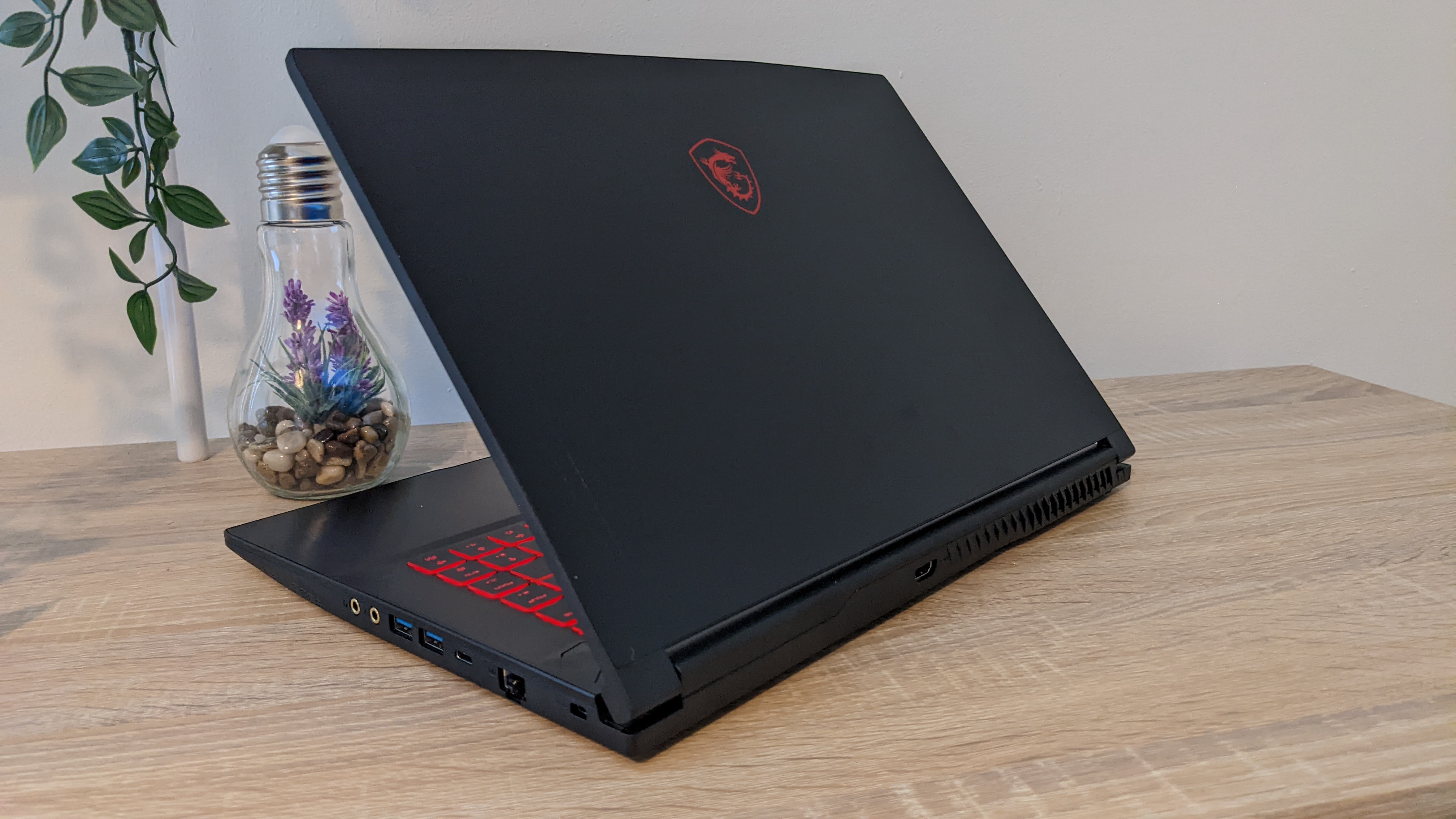
MSI GF63 Thin: Design
- Clean, simple design
- Chassis feels surprisingly robust
- Screen is bright and colorful considering the price
With its 15.6-inch screen and reasonably small bezels, the MSI GF63 Thin looks just like many of the more expensive gaming laptops. Sure, the keyboard backlighting might be fixed red rather than RGB, but everything you’d expect from a gaming laptop is present and accounted for.
The chassis is mostly plastic with a machined metal backing to the screen, but overall it feels sturdier than I expected and the lack of a full-metal body means that it’s a bit more lightweight than other laptops in its class. The screen hinge isn’t flimsy, which I was afraid of, and the MSI branding is largely unobtrusive.
The keyboard here is a pretty standard membrane offering, but the keys have a decent travel distance and don’t feel spongy, meaning that it’s comfortable to use for either gaming or typing. The plastic frame means that there’s a small amount of flex in the center of the keyboard if you press very firmly, but most users are unlikely to notice this during regular use.
The trackpad is something of an oddity; a raised lip surrounds the edges of the rectangle, creating immediate tactile feedback when your finger reaches the edge of the pad. I actually quite like it, but some users might find it annoying. The trackpad is nice and responsive with a good, sturdy click, although with the amount of real estate below the keyboard I do think it could’ve been a little bigger.
Given the asking price, the screen is pretty fantastic; it’s a 1080p IPS-level panel with decent maximum brightness and good color reproduction. The blacks aren’t as sharp as those seen on more expensive laptops, but the overall image sharpness is great. Our review unit comes with a 144Hz refresh rate — making it fantastic for esports games — but an even cheaper 60Hz model is also available.
A 720p webcam and acceptable (if not incredible) speakers and mic make this a viable option for video calls, fitting with its dual-role potential as a laptop for both work and play. Finally, there’s a decent range of ports on offer here. No Thunderbolt is to be expected on a budget laptop, but it’s still got USB-C, three USB-As, an Ethernet port, and an HDMI output if you want to hook up a second display. The right-angled AC adaptor can block one of the USB-A ports when it’s plugged in unless angled away from it, which can be a minor annoyance if you don’t want to run the power cable around the back of the laptop.
- Design: 4/5
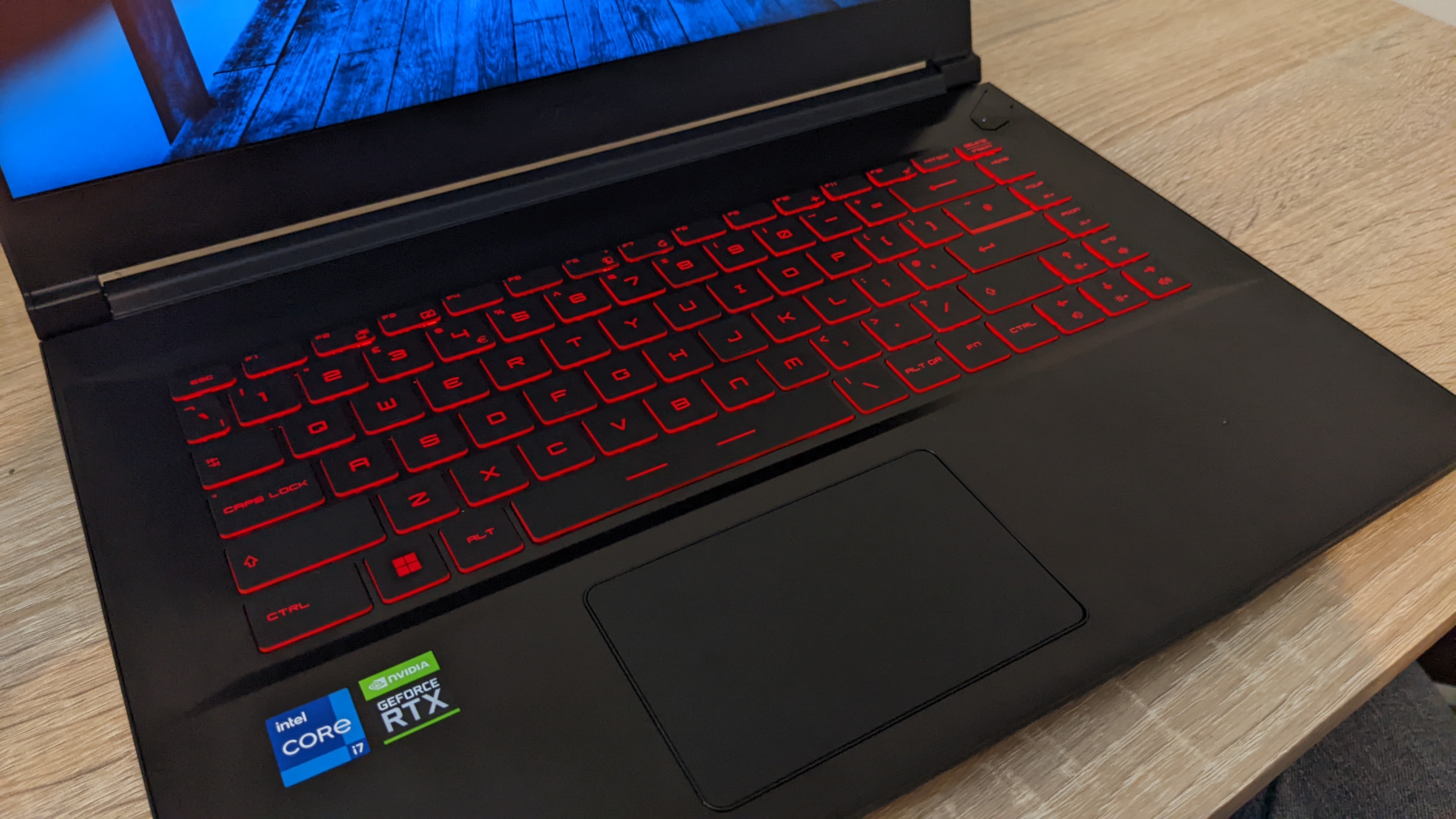
MSI GF63 Thin: Performance
- Solid FHD gaming on a budget
- 30+fps at 1080p Ultra, 60+fps at 1080p Low
- 8GB of RAM could hold it back in some areas
Here's how the MSI GF63 Thin performed in our suite of benchmark tests:
3DMark Night Raid: 25,051; Fire Strike: 21,802; Time Spy: 4,742
Cinebench R20 multi-core: 3,880
GeekBench 5: 1,499 (single-core); 6,985 (multi-core)
PCMark 10 (Modern Office): 5,720
PCMark 10 (Battery life test): 5 hours and 0 minutes
TechRadar Battery Life Test: 5 hours and 28 minutes
Total War: Warhammer III (1080p, Ultra): 43 fps; (1080p, Low): 104 fps
Cyberpunk 2077 (1080p, Ultra): 31 fps; (1080p, Low): 64 fps
Dirt 5 (1080p, Ultra): 42 fps; (1080p, Low): 89 fps
The RTX 3050 Ti laptop graphics card inside this MSI GF63 Thin isn’t going to compete at any resolution above 1080p, but it’s not trying to. If you’re happy with frame rates that stay above 30, you can play the vast majority of games at 1080p with your graphics settings set to Ultra, which is great.
If you’re willing to drop your settings a bit, hitting 60 frames per second shouldn’t be a challenge in most titles. In the Dirt 5 benchmark, I got 42fps at Ultra and was able to get 62fps by dropping the graphics preset to High and dialing a handful of individual settings down to Medium. The game still looked great, too, thanks to the bright colors of the GF63 Thin’s display.
Ray tracing isn’t really an option with the lower-end RTX cards, so don’t get your hopes up there. Enabling it in Cyberpunk 2077 absolutely tanked the frame rate even at lower settings, and since it’s already at 1080p Nvidia’s DLSS upscaling tech isn’t an effective way to improve ray-traced performance. Still, ray tracing is a somewhat niche feature that most games don’t offer, so it’s a minor complaint.
CPU performance was generally decent here; the 11th-gen Intel chips do crumble in comparison to their 12th-gen counterparts, but I didn’t find any glaring issues with how the CPU handled tasks. Performance in CPU-bound games (like the Total War strategy series) was great. Given the price tag, I’m thoroughly impressed with the overall gaming performance here.
Thermal performance is essentially solid. The fans are near-silent when idling and while they do ramp up significantly during games or resource-intensive workloads, they’re not as loud as some gaming laptops I’ve seen. The GF63 Thin remains nice and cool while idling, and the chassis only gets a bit warm when gaming. Core component temperatures remained safely within an acceptable range throughout.
One potential bottleneck for this system is the RAM. With the standard model only featuring 8GB, certain tasks have potential for slowdown; nothing too egregious, but if you’re running memory-dependent software or trying to open 20+ Chrome tabs at once, you might notice some latency. Fortunately, both the memory and the storage are upgradable, so if this is a huge issue for you there’s always the option to unscrew the underside and slot in some new RAM.
- Performance: 5/5
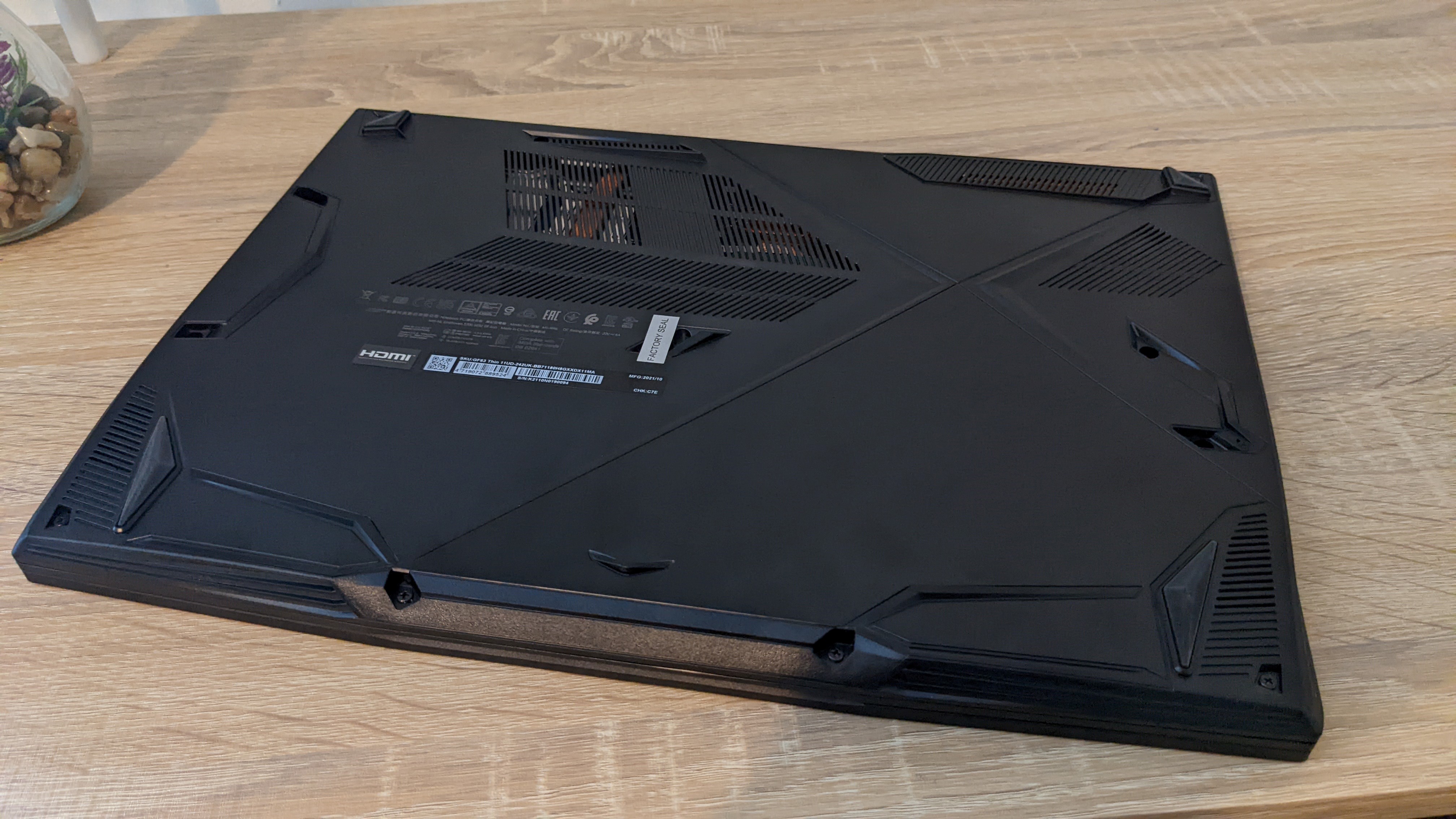
MSI GF63 Thin: Battery life
- Thinner chassis means a smaller battery
- 5 hours on average, less for gaming
- Doesn’t charge particularly fast
With a 52.4Whr battery, the 2022 MSI GF63 Thin offers a bit more power than previous models, but it’s still decidedly average. The thinned-down chassis means there simply isn’t enough room for a larger battery, and while you might expect the lower-end internal components to draw less power, the GF63 Thin can’t manage much more than 5 hours of use at 50% brightness.
It’s not terrible, but it’s not amazing either. Four to five hours of use for general tasks like web browsing is okay, but the GF63 Thin won’t last for two hours in most games even on power-efficiency mode. It also takes longer to charge to full than many laptops too, though this won’t be a problem if you’re an ‘overnight charge’ kind of user. Ultimately, like most gaming laptops, it’s designed to be used for gaming while plugged into a wall outlet.
- Battery life: 3/5
Should you buy an MSI GF63 Thin?
Buy it if...
You want to game on a budget
Let’s face it: gaming laptops can be bloody expensive, but if you cheap out, you’ll likely be stuck with low frame rates or poor graphics. The MSI GF63 Thin walks the line between value and performance expertly.
You need a multi-purpose laptop
Decent performance in just about every area and a reserved design means that the GF63 Thin can happily double as a laptop for work or study, as well as be a solid PC gaming device.
You don’t want a heavy device
Though it might pack a 15.6-inch widescreen display, the GF63 Thin lives up to its name with a relatively compact chassis and low overall weight for a gaming laptop. The AC adaptor isn’t particularly bulky either, which is a plus.
Don't buy it if...
You need good battery life
The battery life on offer here is far from dismal, but it’s not what we’d call impressive, and it certainly isn’t built for hours of gaming on a single charge. If you want to keep the brightness at maximum, you’ll need to plug in.
You want high-resolution gaming
While some gaming laptops offer models with different screen resolutions, the GF63 Thin is only available at 1080p, so if you’ve got designs on gaming at 1440p or even 4K, you’re simply going to have to look elsewhere (and bring more cash with you).
You want ray tracing
While it’s technically capable, the RTX 3050 Ti just isn’t really able to run games with ray-tracing settings turned on, unless you’re willing to dial everything else down to the absolute minimum and effectively lose the benefits of ray-traced graphics in doing so.
Also consider...
Asus ROG Zephyrus G15
If you've got more money to throw around, the Zephyrus G15 is probably the very best gaming laptop you can buy right now, with high-quality performance and design at an extremely competitive price. The only thing it lacks is a webcam - no video calls here.
Read our full Asus ROG Zephyrus G15 review.
Asus TUF Dash F15
A similarly budget-friendly offering to the MSI GF63 Thin, the TUF Dash F15 is more powerful without being too much more expensive — a good choice if you've got a little more money to spend but don't want to break the bank.
Read our full Asus TUF Dash F15 review.
Lenovo Legion 5 Pro
An incredible and fairly priced gaming laptop from Lenovo, the Legion 5 Pro will offer a comparable user experience to the similarly-sized MSI GF63 Thin, but with better performance across the board and superior battery life.
Read our full Lenovo Legion 5 Pro review.
MSI GF63 Thin: Report card
| Value | The pricing across different regions can get a bit confusing, but this is undoubtedly a fantastic value-gaming laptop. | 5 / 5 |
| Design | A straightforward design and a good selection of ports ticks most of our boxes for 'good laptop design'. | 4 / 5 |
| Performance | Considering the price tag, the gaming performance here is pretty great. The i7 processor does well in general workloads, too. | 5 / 5 |
| Battery Life | The battery life isn't dreadful, but it's not exactly impressive either. | 3 / 5 |
| Total | A decent all-rounder gaming laptop for any gamer on a tight budget. | 4.5 / 5 |
- First reviewed August 2022
How We Test
We pride ourselves on our independence and our rigorous review-testing process, offering up long-term attention to the products we review and making sure our reviews are updated and maintained — regardless of when a device was released, if you can still buy it, it's on our radar.

Christian is TechRadar’s UK-based Computing Editor. He came to us from Maximum PC magazine, where he fell in love with computer hardware and building PCs. He was a regular fixture amongst our freelance review team before making the jump to TechRadar, and can usually be found drooling over the latest high-end graphics card or gaming laptop before looking at his bank account balance and crying.
Christian is a keen campaigner for LGBTQ+ rights and the owner of a charming rescue dog named Lucy, having adopted her after he beat cancer in 2021. She keeps him fit and healthy through a combination of face-licking and long walks, and only occasionally barks at him to demand treats when he’s trying to work from home.
